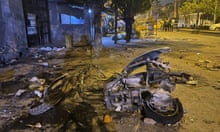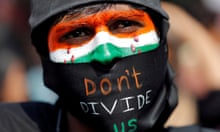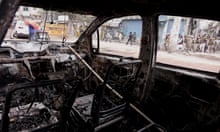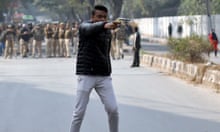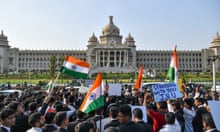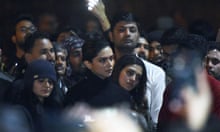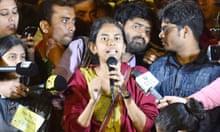Turmoil has continued to escalate across India over a controversial citizenship law that is seen as discriminatory against Muslims, as tens of thousands defied bans on public assembly to take to the streets, the largest internet shutdown yet was imposed and three more people were killed.
Attempts by the authorities to clamp down on the demonstrations by banning large gatherings in areas across the country proved futile, as protesters gathered in their thousands in Delhi, Mumbai, Lucknow, Hyderabad, Bangalore and many other big cities.
The largest protest yet in the capital Delhi took place on Thursday, despite the police denying permission for it, and about 1,200 people were detained.
Roads were shut down throughout the capital, with barricades and thousands of riot police stationed along the roads to block a planned march from the city’s historic Red Fort, but swathes gathered at the New Delhi landmark Jantar Mantar in mass civil disobedience.
The closures of main roads and metro stations led to at least 19 flights being cancelled from Delhi airport, while schools were closed in the afternoon and warnings were issued on the radio for people in Delhi to stay in their homes.
In response to the unrest, the government ordered mobile internet to be blocked in certain areas of the capital. In New Delhi, Vodafone and Airtel announced they had cut services on mobiles in some parts of the city on orders from the authorities. The mobile operator Jio is reported to have followed suit.
The Congress party leader, Rahul Gandhi, described the internet shutdown as an “insult to India’s soul”.
While the more turbulent regions of the country, such as Kashmir and the north-eastern states, have faced regular internet blackouts during unrest – in 2018, 67% of global internet shutdowns took place in India – this was the first time it had been imposed on the capital.
Prashant Bhushan, a lawyer and civic rights activist, said the government was trying to stop people gathering by disrupting mobile services. “Shame that this government is scared of its own people,” he said.
Over a week of increasing unrest, internet blackouts have also been imposed in Assam, Karnataka and parts of Uttar Pradesh, home to a large Muslim minority. Combined with a continuing internet blackout in Kashmir, it meant that on Thursday India had imposed the largest internet blackout in the world.
“India today has the ignominy of being the largest internet shutdown in the world,” said Sitaram Yechury, leader of the Indian Communist party. “It is unacceptable … This is worse than what we saw during the [1975-77] emergency. Today’s protests showed the determination of youngsters to not let democracy be butchered. This was not a one-off protest, such protests will continue.”
Clashes around the country grew increasingly violent as gatherings were banned in areas including Uttar Pradesh state, parts of the north-east and parts of Bihar, New Delhi, Hyderabad, Bengaluru and Chennai. Two people died in Mangaluru after the police opened fire on protesters, while one person died in Lucknow, reportedly after being shot. It brings the death toll to nine, after six protesters died in the clashes in Assam over the past week.
Teargas was used against demonstrators in Gujarat, and in Lucknow police were reported to have fired on people, leaving at least three needing hospital admission, while in Kerala water cannons were used to disperse activists. Thousands were detained by police country-wide and in Bengaluru it was reported the police ran out of buses to transport everyone they had arrested.
Among those arrested on Thursday was Ramachandra Guha, one of India’s foremost historians and a biographer of Gandhi. Guha, 61, was giving an interview on the sidelines of a banned protest in Bengaluru when he was approached by officers and hustled away.
“I have been detained for holding a poster of Gandhi and speaking about the constitution to the press,” he told local media as he was being pulled away. “I am protesting non-violently, but look they are stopping us,” said Guha, who was shown being dragged by three police officers in footage broadcast on Indian news channels.
Under the citizenship law passed by parliament last week, Hindu, Christian, Jain, Buddhist and Sikh migrants from Bangladesh, Pakistan and Afghanistan will be allowed to claim Indian citizenship. The same will not apply to Muslim migrants, who the BJP government argues are not a threatened minority in these countries.
The protests, which have continued for days across cities and university campuses, have been fuelled further by anger over alleged police brutality at predominantly Muslim universities in Delhi and Uttar Pradesh.
One protester, Kawalpreet Kaur, of All India Students Association, posted that police had filled 14 buses with detainees at the Red Fort landmark. “But more and more people are pouring in, too many to be detained,” she added.
In one of the largest demonstrations yet, more than 20,000 people took to the streets in a demonstration in Kolkata on Thursday.
Among the protesters was Nousheen Baba Khan, a political science student. “Why would we not protest?” she said. “I cannot sleep at night; I cannot concentrate on studies after seeing people around me at home and outside worried. My grandmother who is more than 80 often asks me, ‘Will they send me to jail? But I have my Aadhaar Card. Am I not Indian?’ My conscience does not allow me to sit back at home.”
Khan added: “India is rising in protest against the Citizenship Amendment Act and the protests are creating history.”
Shaikh Azizur Rahman contributed reporting from Kolkata

